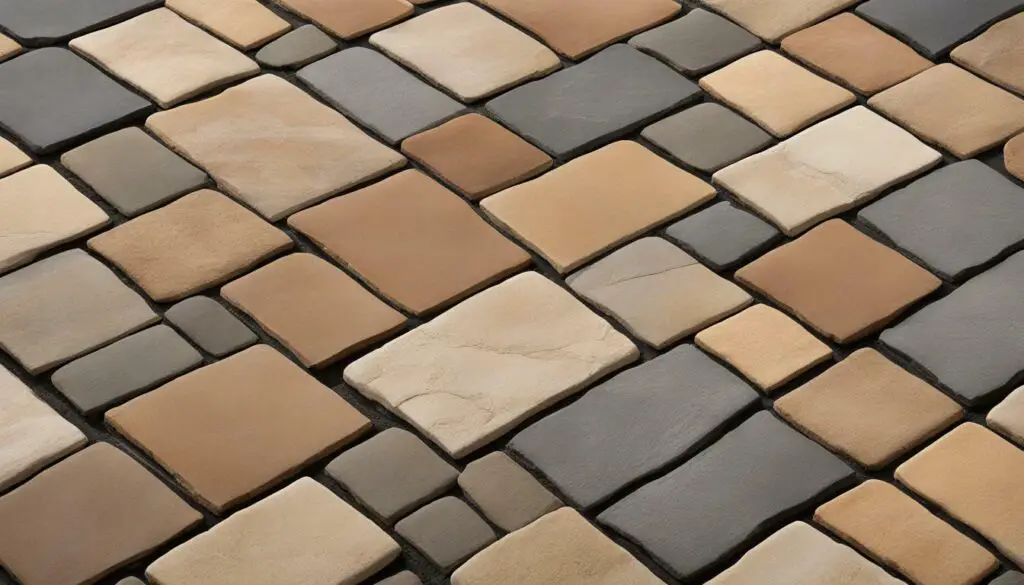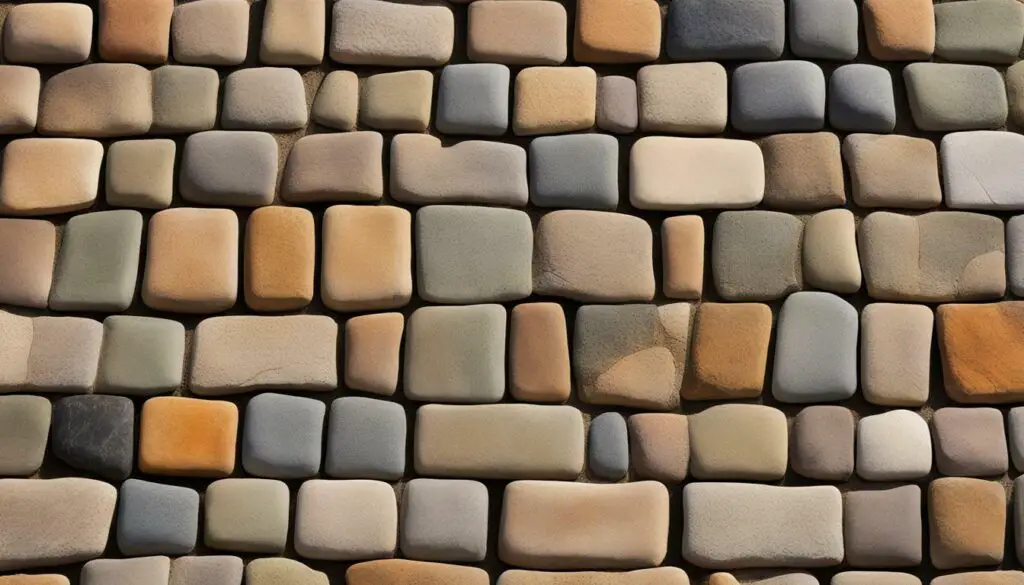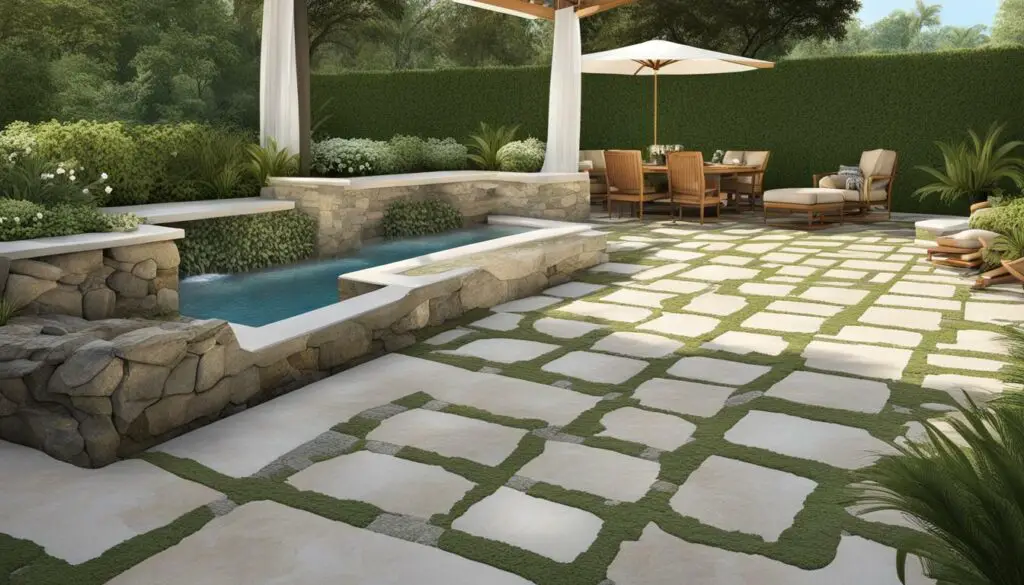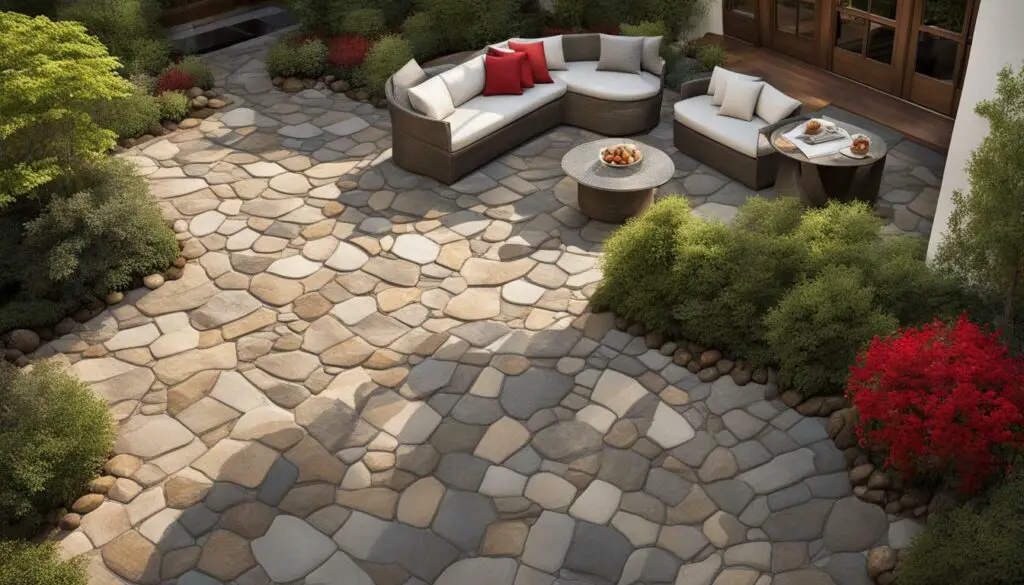Are you looking to elevate the look and functionality of your outdoor space? Look no further than natural stone pavers. These durable and versatile materials provide a timeless and elegant touch to any landscaping project, from walkways to patios to pool decks.
By choosing natural stone pavers, you not only add value and beauty to your property, but you also benefit from their ability to withstand the elements and require minimal maintenance. Plus, with a variety of colors, shapes, and textures available, you can customize your design to fit your unique style and vision.
Key Takeaways
- Natural stone pavers are a timeless and elegant choice for any outdoor space
- They offer durability, low maintenance, and a variety of customization options
- Using natural stone pavers adds value and enhances the curb appeal of your property
What Are Natural Stone Pavers?
If you’re looking to enhance your outdoor space, natural stone pavers might be the perfect solution. But what exactly are they?
Natural stone are flat pieces of stone that are used to create outdoor surfaces such as patios, walkways, and pool decks. They are typically made from natural materials such as limestone, slate, granite, or sandstone, and come in a variety of shapes and sizes.
One of the defining characteristics of natural stone pavers is their durability. They are able to withstand heavy foot traffic, extreme weather conditions, and the wear and tear of outdoor use. Additionally, they are low-maintenance and can last for many years with proper care.
Another benefit of natural stone pavers is their versatility. They can be used in a variety of outdoor settings, from rustic to modern, and can be arranged in a wide range of patterns to create unique and visually appealing designs.
Overall, natural stone pavers offer a durable, low-maintenance, and versatile option for enhancing any outdoor space.

Different Types of Natural Stone Pavers and Their Benefits
When it comes to natural stone pavers, there are various options to choose from, each with its unique features and benefits. Here are some of the most common types of natural stone pavers:
| Type | Description | Benefits |
|---|---|---|
| Flagstone | Natural, flat stones with irregular shapes and textures | Durable, slip-resistant, low maintenance, unique aesthetic appeal |
| Travertine | Light-colored natural stone with a porous surface and visible grains | Non-slip surface, high durability, suitable for use around pools, distinctive look |
| Slate | Dark-colored, fine-grained natural stone that splits into thin, flat layers | Durable, low maintenance, slip-resistant, impervious to weather elements, earthy tones complement natural surroundings |
| Granite | Durable, dense natural stone with a polished or flamed finish | Resistant to heavy foot traffic, scratches, stains, and extreme weather conditions, available in multiple color options |
If you’re looking for a more rustic look, cobblestone and fieldstone pavers can also be used. Cobblestones provide a textured, weathered look and come in a variety of colors, while fieldstones offer a more natural and organic look thanks to their rounded edges and irregular shapes.
Regardless of the type of natural stone paver you choose, they all offer several benefits. Natural stone is durable, long-lasting, and can withstand harsh weather conditions, making it ideal for outdoor spaces in any climate. Additionally, natural stone pavers offer a unique and natural aesthetic appeal that can enhance the beauty of any outdoor space.
Why Choose Natural Stone Pavers for Your Outdoor Space?
If you’re looking to upgrade your outdoor space, natural stone pavers are an excellent choice. Not only do they add visual appeal, but they also offer a range of benefits that make them a popular choice among homeowners.
One of the primary advantages of natural stone pavers is their ability to withstand harsh weather conditions. Unlike other materials such as concrete or asphalt, natural stone is resistant to cracking and damage caused by extreme temperatures, rain, and snow.
In addition to their durability, natural stone pavers also provide a unique aesthetic appeal. With a variety of colors, textures, and finishes available, you can choose a style that complements your home and enhances your outdoor living space.
Another benefit of natural stone pavers is their ability to increase property value. The addition of natural stone pavers to your outdoor space can create a more polished and inviting look, which can be a major selling point if you’re planning to sell your home in the future.
Overall, natural stone pavers are a versatile and durable choice for enhancing your outdoor space. Whether you’re looking to create a patio, walkway, or outdoor dining area, natural stone pavers can provide a lasting and beautiful solution.

How to Lay a Natural Stone Patio in 8 Steps
Laying a natural stone patio can be a challenging but rewarding DIY project. With the right tools and preparation, you can achieve a professional-looking installation that will last for years to come. Here are eight steps to follow:
- Plan and measure: Decide on the size and shape of your patio and measure the area to determine how many stones you will need. Purchase about 10% more than the exact amount to allow for cutting and wastage.
- Prepare the site: Clear the area and make sure it is level. Excavate the soil to a depth of about 6 inches and fill with crushed stone or gravel, tamping it down to create a stable base.
- Spread sand: Spread a layer of sand or stone dust over the base, leveling it with a screed board. This will provide a smooth surface for the stones and help prevent shifting.
- Lay the stones: Starting at one corner, lay the stones on top of the sand in the desired pattern. Use a rubber mallet to tap them into place and a level to ensure they are even. Cut any stones with a wet saw or chisel to fit the edges and corners.
- Add edging: Install plastic or metal edging along the sides of the patio to keep the stones in place and prevent them from moving outward.
- Fill gaps: Once the stones are in place, sweep sand or stone dust over the surface and into the gaps between the stones, using a broom or brush. Use a plate compactor to compact the stones and sand, filling the gaps until they are flush with the surface.
- Clean: Use a power washer to clean any remaining sand or debris off the surface of the patio.
- Seal: Apply a sealer to protect the stones from weather and staining, following the manufacturer’s instructions.
By following these steps, you can create a beautiful and durable natural stone patio that will enhance the look and functionality of your outdoor space.

The Pros and Cons of Natural Stone Pavers
When it comes to choosing the right paving material for your outdoor space, natural stone pavers are an excellent option to consider. They offer a timeless and elegant appearance that can enhance the look and feel of any property. However, like any other product, natural stone pavers have their own set of advantages and disadvantages that you should be aware of before making a final decision.
Pros of Natural Stone Pavers
| Advantages | Description |
|---|---|
| Durability | Natural stone pavers are extremely durable and can last for many years with little maintenance. |
| Aesthetics | Natural stone pavers offer a unique and natural appearance that can enhance the overall look of your outdoor space. |
| Low maintenance | They are easy to clean and maintain, and you can use simple household cleaners to keep them looking great. |
| Resale value | Natural stone pavers can add value to your property, making them a wise investment for your home. |
As you can see, natural stone pavers have a lot of advantages that make them a popular choice for many homeowners. They are not only durable, but they also offer a unique and natural appearance that can enhance the aesthetics of your outdoor space.
Cons of Natural Stone Pavers
However, there are also a few factors to consider before choosing natural stone pavers. These include:
| Disadvantages | Description |
|---|---|
| Cost | Natural stone pavers tend to be more expensive than other paving materials, making them a significant investment. |
| Installation | They can be harder to install compared to other materials, and may require professional installation to ensure proper placement. |
| Slipperiness | Some types of natural stone pavers can be slippery when wet, making them a potential safety hazard. |
| Maintenance | While natural stone pavers are low maintenance, they may require occasional sealing to prevent staining or discoloration. |
Despite the disadvantages, natural stone pavers remain a popular choice for homeowners who are looking for a durable and aesthetically pleasing option for their outdoor space. By weighing the pros and cons, you can make an informed decision about whether natural stone pavers are the right choice for you and your home.

Are Pavers Considered Natural Stone?
One common question that arises when discussing natural stone pavers is whether pavers are considered natural stone. The answer is no; pavers are not considered a type of natural stone. Pavers are typically made from concrete, brick, or other manufactured materials.
Natural stone pavers, on the other hand, are made from natural rock formations, such as sandstone, limestone, or granite. This gives them a unique texture, color, and pattern that cannot be replicated in manufactured pavers.
It’s important to note that while pavers and natural stone pavers may look similar, there are distinct differences in their composition, durability, and maintenance requirements. Natural stone pavers are generally stronger and more durable than manufactured pavers and can withstand harsh weather conditions better. They also tend to require less maintenance over time.
Overall, if you’re looking for a truly natural and durable option for your outdoor space, natural stone pavers are the way to go. While they may require a higher initial investment, their longevity and unique beauty make them a worthwhile choice.

Is Natural Stone More Expensive Than Pavers?
If you’re considering natural stone pavers for your outdoor space, one question that may arise is whether they are more expensive than other types of pavers. The answer is, it depends.
Natural stone pavers can be more expensive than some types of pavers, such as concrete or brick. However, they can also be more affordable than other types, such as high-end porcelain pavers. The cost of natural stone pavers can vary based on factors such as the type of stone, the size and shape of the pavers, and the complexity of the installation.
While natural stone pavers may have a higher upfront cost, they offer long-term benefits that can make them a worthwhile investment. They are incredibly durable and can withstand harsh weather conditions, meaning they won’t need to be replaced as frequently as other materials. Additionally, they can enhance the overall aesthetic appeal of your outdoor space, which can increase your property value.

When making a decision, consider your budget and the overall look and feel you are trying to achieve in your outdoor space. If you are willing to invest in a high-quality, long-lasting material that will enhance your outdoor space in both beauty and function, natural stone pavers may be the right choice for you.
Conclusion
Investing in natural stone pavers is a smart choice for enhancing your outdoor space. Not only do they add visual appeal, but they also offer durability and low maintenance. By understanding the different types of natural stone pavers available and their specific benefits, you can choose the perfect option for your patio or walkway.
While natural stone pavers may come at a higher price point than other types of pavers, they are definitely worth the investment in terms of long-term value and aesthetic appeal. Plus, with their ability to withstand weather elements and improve your property’s curb appeal, you’ll have a beautiful and functional outdoor space for years to come.
Transform Your Outdoor Space Today
By following the step-by-step guide on how to lay a natural stone patio and considering the pros and cons of natural stone pavers, you can ensure that your outdoor space is transformed into a beautiful oasis that you and your guests will enjoy for years to come. So, what are you waiting for? Start exploring the different options of natural stone pavers today and see the transformation for yourself.
Thanks For the Great Attention!
Good Bye & Take Care
Happy Learning
Also, Read,
1000sqft House Plinth Beam Cost
POP Vs Gypsum Vs PVC Vs Grid False Ceiling – An Ultimate Comparision
Wall Mounted vs Floor Mounted Toilets
FAQ
Frequently Asked Questions
Q: What are natural stone pavers?
A: Natural stone pavers are flat, durable stones that are used for outdoor landscaping projects such as patios, pathways, and driveways. They are made from natural materials such as granite, limestone, and sandstone, and come in a variety of sizes, shapes, and colors.
Q: What are the different types of natural stone pavers and their benefits?
A: Some common types of natural stone pavers include travertine, bluestone, and slate. Each type has unique benefits in terms of durability, aesthetics, and maintenance. For example, travertine is a great choice for warmer climates as it stays cool in the sun, while bluestone offers a classic and elegant look.
Q: Why choose natural stone pavers for your outdoor space?
A: Natural stone pavers offer many advantages over other materials such as concrete or brick. They are durable, weather-resistant, and can withstand heavy foot traffic. In addition, they can enhance the curb appeal and overall value of your property.
Q: How do I lay a natural stone patio?
A: Follow these 8 steps to lay a natural stone patio: 1) Plan and measure the area, 2) Clear the area and level the ground, 3) Add a base layer, 4) Add a layer of sand, 5) Lay the stones in your desired pattern, 6) Cut and trim the stones to fit, 7) Fill the gaps with sand, and 8) Seal the stones to prevent damage.
Q: What are the pros and cons of natural stone pavers?
A: Some pros of natural stone pavers include their durability, natural beauty, and versatility in design. However, natural stone can be more expensive than other materials, can require more maintenance, and may be less suitable for certain climates.
Q: Are pavers considered natural stones?
A: Not all pavers are considered natural stones. While some pavers are made from natural materials, others are made from concrete or synthetic materials that mimic the look of natural stone.
Q: Is natural stone more expensive than pavers?
A: Natural stone pavers can be more expensive than other types of pavers due to their durability, natural beauty, and uniqueness. However, the price can vary depending on the type of natural stone and the size of the project.



